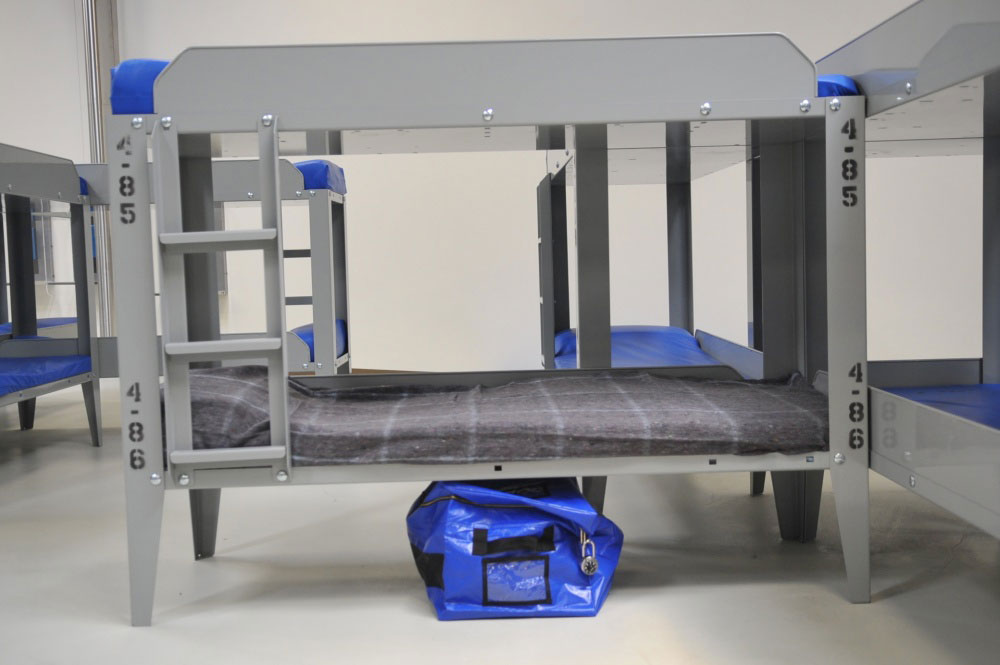
July 10, 2020; DCist and National Public Radio (WAMU-FM)
As of July 10, 2020, US Immigration and Customs Enforcement (ICE) reported that there were 268 confirmed cases of the coronavirus at the Farmville Detention Center in Virginia, which holds 412 detainees. This is the center that, according to their website, “is considered the role model and trendsetter for providing safe, humane, and secure conditions in civil detention service in America.”
DCist said last week that an ICE spokesperson sent them an email that claimed “the majority of detainees who tested positive are asymptomatic.” However, “detainees and their lawyers describe an environment where many people are actively exhibiting symptoms associated with COVID-19, and where people fear they will die of complications from the virus.”
One of the immigration attorneys serving three clients at Farmville, Brian Casson, states, “We have clients calling and saying that they want us to try and arrange a way for them to see their family, because they feel like they’re going to die in detention.”
The virus initially surfaced at the center in April, after two detainees were transferred from another Virginia detention center, and after arriving, tested positive. The situation worsened in June when ICE transferred 74 detainees to Farmville from centers in Florida and Arizona—two known June hotspots for the virus. Fifty-one of the 74 transferred detainees turned out to be positive for COVID-19.
Casson points out that it’s ICE’s “fault that the coronavirus was introduced to the facility…it was either done with malice, negligence, or recklessness.”
Regardless of intent, the virus is now rampant at the Virginia center, including among those who were at Farmville prior to the June transfer. ICE stated in their email to WAMU-FM and DCist that the June-transferred detainees were quarantined upon arrival, and Farmville has implemented greater preventive hygiene measures within the facility, including providing three N95 masks and two washable masks to each detainee.
But these measures and the current conditions reported by ICE contradict what immigration attorneys and detainees are claiming is actually happening within the center. Adina Appelbaum, an attorney with CAIR Coalition, tells DCist that “people are scared for their lives and are saying they can’t stand up…They can’t eat. They’re having trouble breathing. People are passing out on the floor. People are unable to stand up for the count.”
Sign up for our free newsletters
Subscribe to NPQ's newsletters to have our top stories delivered directly to your inbox.
By signing up, you agree to our privacy policy and terms of use, and to receive messages from NPQ and our partners.
A detainee named José says “everyone around him is sick” and believes that out of the 70 people in his dorm, only two had negative test results. He feels the staff is not sympathetic to their suffering: “We’re people being kept in here, not animals.” José’s experience correlates to another detainee at Farmville, a young man in his 20s who said “he had a fever, a cough, headaches, body aches and trouble breathing, but had gone five days without receiving a COVID test or visiting a doctor. Despite his requests to get a test, he says he only received Tylenol as treatment and was not isolated from his dorm.”
He also noted that social distancing is nearly impossible in his 80-person dorm: “How are we going to be safe if we don’t even have space to breathe?”
Reportedly, some of the detainees who attempted to protest conditions at the Detention Center were met with pepper spray. According to DCist, Farmville Director Jeffrey Crawford gave sworn testimony describing two recent incidents in which guards used pepper spray on detainees. In the first, three detainees were “asked to move dorms after testing positive [and] ‘became violent’ and a guard pepper sprayed two of them.” In the second instance, on July 1st, Crawford claimed that “guards used pepper spray on a group of detainees who ‘refused to comply with the 10:30 a.m. count.’”
The immigration attorneys representing the Farmville detainees deny that the protests in the first instance were violent, and a young detainee told DCist last month that some sick detainees were pepper-sprayed because they were too weak to stand for a count. It is unclear whether this instance is the same as the second one noted by Crawford in his testimony.
There have been consistent calls for the release of medically at-risk detainees in Farmville since April, when immigrant advocacy groups feared a potential outbreak at the center and filed a temporary restraining order. A Virginia judge denied the request on grounds that Farmville had adequate safeguards in place to contain and control the spread of the virus.
ICE states it has voluntarily released over 900 detainees due to medical conditions, but three detainees have died in ICE custody, and over 3,500 have contracted the virus while in custody. Another attorney for CAIR Coalition, Edith Hinson, has been unable to have any of her clients released from the Farmville Detention Center, some of whom suffer from AIDS, heart problems, or diabetes. As the wife of one diabetic Farmville detainee put it, “He’s a human being. And not just my husband, but every single one of those people in there. They’re human beings, and they deserve our respect.”
Despite the Virginia judge’s ruling in April, Farmville does not appear to have adequate means to handle the virus, as three months later, 65 percent of its detainees are currently positive for COVID-19, and Farmville has by far the largest outbreak among detention centers—a trendsetter indeed.—Beth Couch












